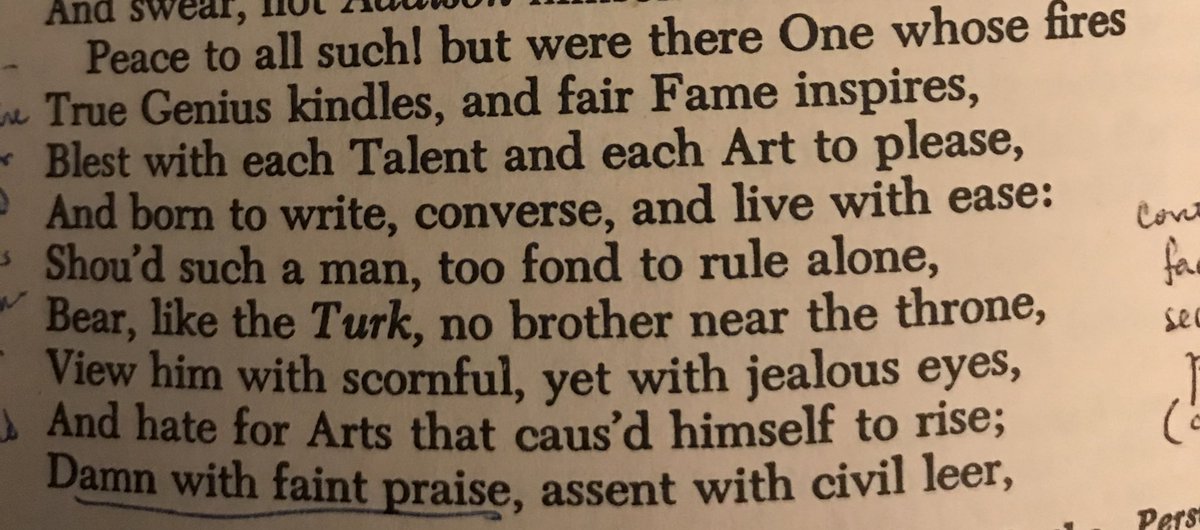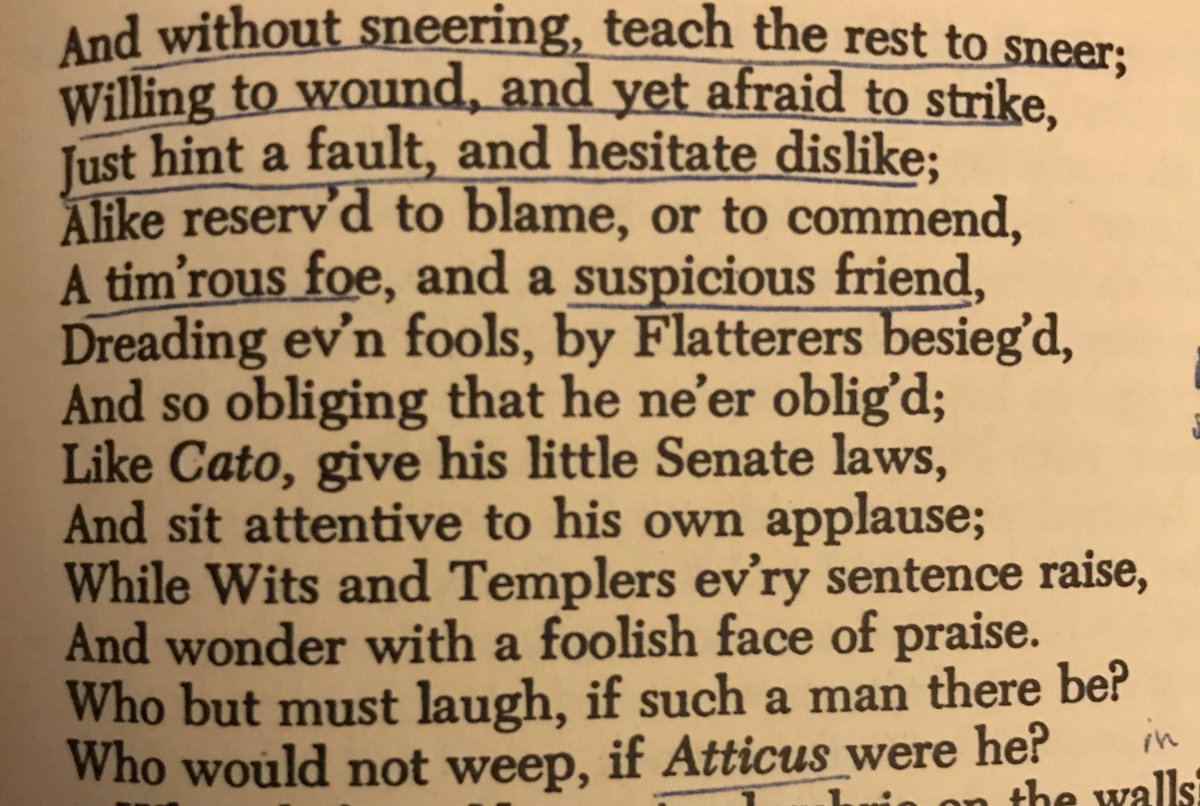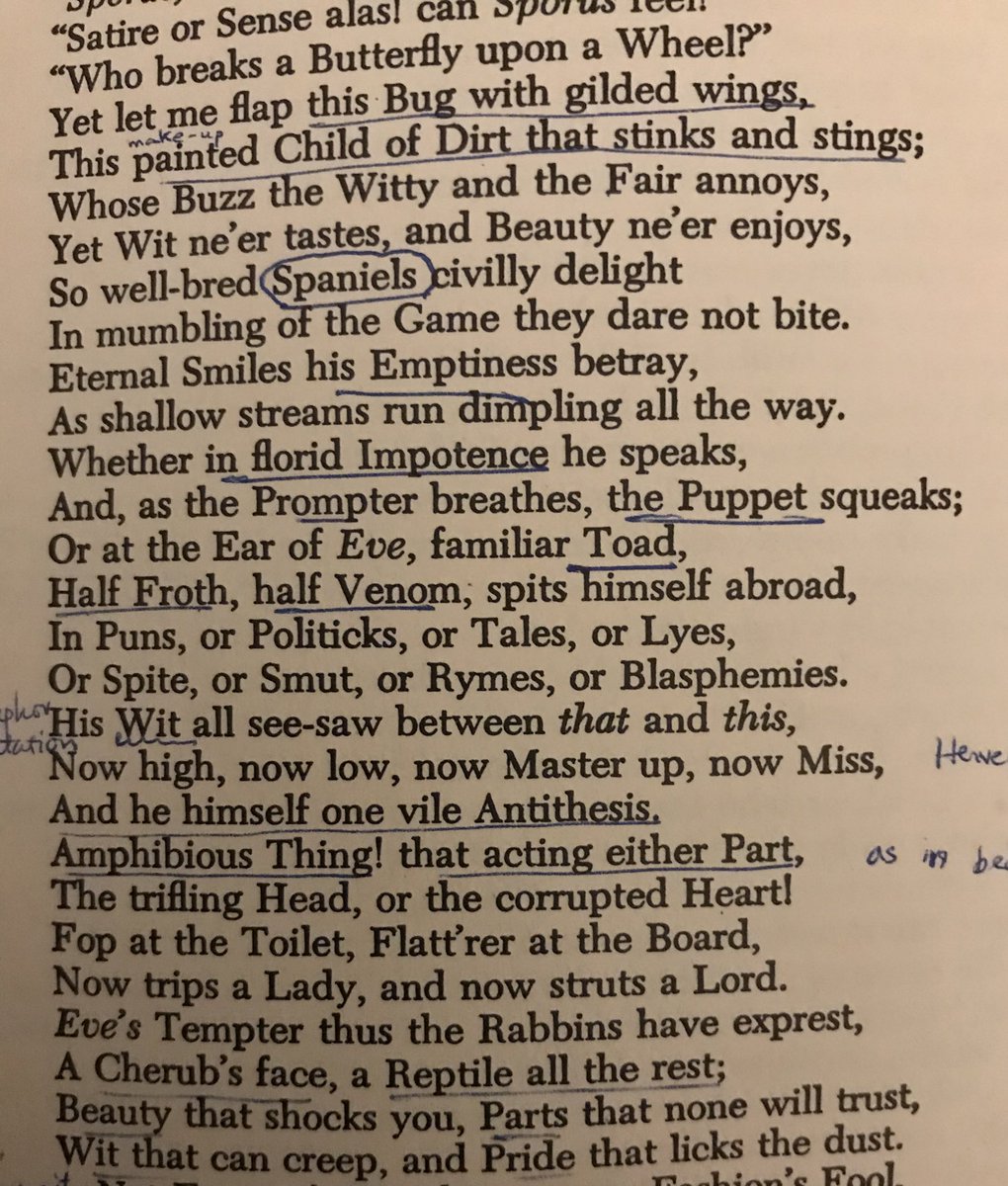At the heart of ‘Epistle to Arbuthnot’ are three masterful portraits of literary types who’ve abused their power - critic, patron & propagandist. This would still be a great poem without these portraits, but the passages on Atticus, Bufo, and Sporus make the poem memorable.
Atticus is a thinly disguised portrait of Addison, the literary dictator whose ego could not tolerate Pope’s independent streak. This passage gives us one of Pope’s greatest lines, ‘Damn with faint praise.’
In the portrait of Bufo, the patron whose ego must constantly stroked, Pope shows exactly why the artist had to establish his independence. He sheds a tear for Dryden and Gay, who were always dependent on patronage, and counts himself very fortunate.
And then there’s Sporus, the serpent at Wslpole’s ear, the lampooning propagandist Lord Hervey. Pope gives some great lines to Arbuthnot - ‘That thing of silk’, ‘that mere white curd of Ass’s milk’ - but saves the best for himself. This is trenchant satire and very lively verse.
I have to agree with Pope - sometimes the butterfly must be broken on the wheel. And sometimes the butterfly is simply a disguise hiding the ‘painted child of dirt’, a ‘familiar toad, half froth, half venom’, or a ‘cherub’s face, a reptile all the rest.’
I suspect this rogue’s gallery would be on Pope’s radar today: ‘Eternal smiles [their] emptiness betray / As shallow streams run dimpling all the way / ... / In puns, or politicks, or tales, or lyes, / Or spite, or smut, or rymes, or blasphemies.’
Nearly 300 years after its composition, the ‘Epistle to Dr. Arbuthnot’ retains all its relevance. I’m in awe of every couplet. Sheer perfection.

 Read on Twitter
Read on Twitter


![I suspect this rogue’s gallery would be on Pope’s radar today: ‘Eternal smiles [their] emptiness betray / As shallow streams run dimpling all the way / ... / In puns, or politicks, or tales, or lyes, / Or spite, or smut, or rymes, or blasphemies.’ I suspect this rogue’s gallery would be on Pope’s radar today: ‘Eternal smiles [their] emptiness betray / As shallow streams run dimpling all the way / ... / In puns, or politicks, or tales, or lyes, / Or spite, or smut, or rymes, or blasphemies.’](https://pbs.twimg.com/media/EZTYxzAWAAobbFH.jpg)
![I suspect this rogue’s gallery would be on Pope’s radar today: ‘Eternal smiles [their] emptiness betray / As shallow streams run dimpling all the way / ... / In puns, or politicks, or tales, or lyes, / Or spite, or smut, or rymes, or blasphemies.’ I suspect this rogue’s gallery would be on Pope’s radar today: ‘Eternal smiles [their] emptiness betray / As shallow streams run dimpling all the way / ... / In puns, or politicks, or tales, or lyes, / Or spite, or smut, or rymes, or blasphemies.’](https://pbs.twimg.com/media/EZTYx0wXQAISfkE.jpg)
![I suspect this rogue’s gallery would be on Pope’s radar today: ‘Eternal smiles [their] emptiness betray / As shallow streams run dimpling all the way / ... / In puns, or politicks, or tales, or lyes, / Or spite, or smut, or rymes, or blasphemies.’ I suspect this rogue’s gallery would be on Pope’s radar today: ‘Eternal smiles [their] emptiness betray / As shallow streams run dimpling all the way / ... / In puns, or politicks, or tales, or lyes, / Or spite, or smut, or rymes, or blasphemies.’](https://pbs.twimg.com/media/EZTYx2aXkAA50oZ.jpg)
![I suspect this rogue’s gallery would be on Pope’s radar today: ‘Eternal smiles [their] emptiness betray / As shallow streams run dimpling all the way / ... / In puns, or politicks, or tales, or lyes, / Or spite, or smut, or rymes, or blasphemies.’ I suspect this rogue’s gallery would be on Pope’s radar today: ‘Eternal smiles [their] emptiness betray / As shallow streams run dimpling all the way / ... / In puns, or politicks, or tales, or lyes, / Or spite, or smut, or rymes, or blasphemies.’](https://pbs.twimg.com/media/EZTYx4dWkAEhpzO.jpg)


